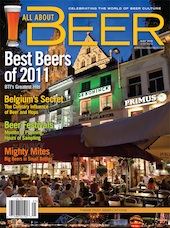Brauerei Michael Plank is a 391 year-old brewery named after the caretaker who has lived all those years.. Today’s Michael Plank is the 16th generation of first-born sons named Michael. His five year-old first son, Michael, will be the 17th generation. This little brewery thrives, producing 10,000 hectoliters (8,500 U.S. barrels) of beer a year, and winning numerous World Beer Cup Awards including “2006 World Beer Cup Champion Brewery and Brewmaster.”
Before personal computers, before internet, before paper copying machines, before fax and before mobile telephones, consumers were fashioning the beer revolution.
Charlie Papazian (right) with the 16th Michael Plank. (Sandra Papazian)
On a recent visit, I marveled at his 20 year-old barrel-aged weizenbock, kept literally under lock and key. It has hints of tamarind and cherry with warming sherry/raisin-like character. A gentle sourness and mustiness of oak leave a lasting impression.
Michael’s family has brewed in the Bavarian village of Laaber since 1617. They also farm fish and wood; keep cattle, pigs and horses; and manage area real estate, the brewery and restaurant. They even run a GPS-guided local beer delivery service. With their forward thinking, they know what it means to live and brew. This is a four century-old success story.
There are thousands of small brewers either thriving or struggling to survive. Being a successful professional small brewer is about making excellent, flavorful beer that differentiates from the international light lager style, and about having enough business sense to navigate one world that continues to consolidate, while another consumer-driven world demands flavor and diversity. I can’t help but note that in the USA and a few other select craft beer markets, small brewers thrive more than they do elsewhere. Why?
Examine current beer culture. Thirty years ago, there were only a few individuals championing better beer. When American pale ale, stout and porter were first brewed in the U.S., the markets for these styles did not exist. I cannot imagine a large corporation coming out with a bold, expensive product for a market that does not exist. Amateur/consumer innovation is ahead of existing producers.
The participation of individual consumers is driving change in the beer business. They are a driving force of what I will refer to as the democratization of process. Accelerating communication has only enhanced this fundamental process. Thirty years ago the word “micro” first prefixed the word “computer.” Simultaneously the “beer revolution” was in the hands of the individual homebrewer and beer enthusiast then, as now.
The past 30 years of the “beer revolution” is a phenomenon attributable to one of the first “open source” collaborative experiences in this age of consumer-driven innovation. Before personal computers, before internet, before paper copying machines, before fax and before mobile telephones, consumers were fashioning the beer revolution.
What is extraordinary to me is how the succeeding professional and homebrewing craft brewing communities continue to guide their creative destiny. The last 30-year history of American beer culture is a mirror image of the way the rest of the world has embraced choice, diversity, information, education, grassroots activism, quality, personality, passion, pleasure and flavor (both in the real and metamorphic sense). These terms are contemporary to most, but they are the foundation of craft beer’s flavor and diversity—three decades ago!
There are some parts of the world where beer cultures have not embraced the interests, change, activism and passion of the individual: beer is controlled by an “elite.” Sadly, some of these beer cultures are languishing in their past success. Strong words? Yes, though I do not condemn, I observe.
As Americans, we live in a country where beer is celebrated and enjoyed in all its diversity as it has never been enjoyed before. Elsewhere, beer cultures that celebrate flavor and diversity emerge and/or continue to thrive for one reason: they have established and nurtured brewing communities that support each other. To succeed and innovate, they recognize that it is far better to associate with each other and share in their efforts. As in any revolution, the competition is not amongst the revolutionaries. Their quest is to elevate the value of beer for the beer drinker. Creating a variety of beers of exceptional qualities, they cooperatively grow beer drinker interest through education.
Singapore, Japan, Argentina, Chile, Italy, Denmark, Sweden, Colombia, Brazil, Mexico and Canada are but a few of the countries impregnated with the seeds of change and “open sourcing,” harnessing the enthusiasm between brewer and beer drinker. The process of democratizing beer and creating added value for the beer drinker is in progress. It needs continued nurturing.











